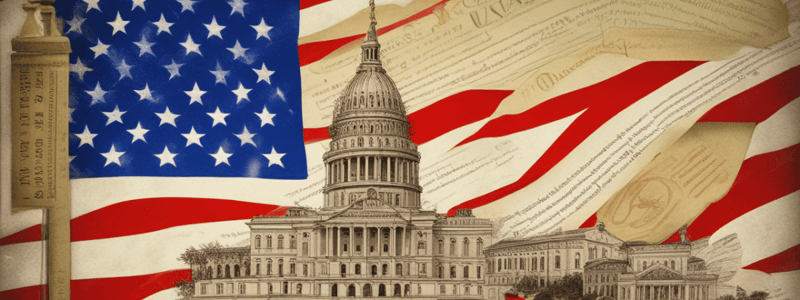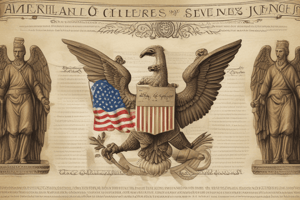Podcast
Questions and Answers
Which type of committee includes members from both chambers of Congress?
Which type of committee includes members from both chambers of Congress?
- Special Committees
- Select Committees
- Joint Committees (correct)
- Standing Committees
What is the wooden box into which house members insert proposed bills called?
What is the wooden box into which house members insert proposed bills called?
- Container
- Locker
- Tray
- Hopper (correct)
Who has the most power in the US Senate according to the text?
Who has the most power in the US Senate according to the text?
- Majority Whip
- Speaker of the House
- President Pro Tempore
- Senate Majority Leader (correct)
What is the role of chief of state primarily characterized as?
What is the role of chief of state primarily characterized as?
How many electors are there in the Electoral College?
How many electors are there in the Electoral College?
Who is responsible for the creation of the President's annual budget?
Who is responsible for the creation of the President's annual budget?
'Pork barrel' refers to what in the context of congressional legislators?
'Pork barrel' refers to what in the context of congressional legislators?
'Statutory Powers' refer to presidential powers granted by whom?
'Statutory Powers' refer to presidential powers granted by whom?
'Casework' involves providing personal aid to which group of individuals?
'Casework' involves providing personal aid to which group of individuals?
'Ombudsperson' refers to a role where a member of Congress advocates for constituents with which entities?
'Ombudsperson' refers to a role where a member of Congress advocates for constituents with which entities?
Who initiated the New Deal, a series of social programs that transformed views of the federal government's role?
Who initiated the New Deal, a series of social programs that transformed views of the federal government's role?
Which US President's administration was granted the broadest latitude to use emergency powers in cases involving foreign affairs by the Supreme Court?
Which US President's administration was granted the broadest latitude to use emergency powers in cases involving foreign affairs by the Supreme Court?
Which landmark case granted the US Supreme Court its most significant power?
Which landmark case granted the US Supreme Court its most significant power?
What is considered the highest form of law in the United States?
What is considered the highest form of law in the United States?
In the federal court system, what is the main court of original jurisdiction for MOST cases?
In the federal court system, what is the main court of original jurisdiction for MOST cases?
Which branch of the US military does the President act as the supreme commander of the US Coast Guard?
Which branch of the US military does the President act as the supreme commander of the US Coast Guard?
'Judicial Review' is the most significant power exercised by which body?
'Judicial Review' is the most significant power exercised by which body?
'Dual court system' refers to which court system in the United States?
'Dual court system' refers to which court system in the United States?
'Court of appellate jurisdiction' is primarily the role of which legal body in the United States?
'Court of appellate jurisdiction' is primarily the role of which legal body in the United States?
'Control over military strategy' is a role primarily associated with which position in the United States?
'Control over military strategy' is a role primarily associated with which position in the United States?
Which amendment in the US Constitution is primarily concerned with criminal due process rights?
Which amendment in the US Constitution is primarily concerned with criminal due process rights?
What is the primary focus of Article V of the US Constitution?
What is the primary focus of Article V of the US Constitution?
Which Article in the US Constitution describes the powers and structure of the judicial branch?
Which Article in the US Constitution describes the powers and structure of the judicial branch?
What is the concept that national laws prevail over conflicting state laws known as?
What is the concept that national laws prevail over conflicting state laws known as?
Which of the following is not a means of political expression guaranteed under the US Constitution?
Which of the following is not a means of political expression guaranteed under the US Constitution?
What was the main factor in the eventual ratification of the US Constitution?
What was the main factor in the eventual ratification of the US Constitution?
Which branch of the US government was primarily designed to be responsive to the needs and the will of the people?
Which branch of the US government was primarily designed to be responsive to the needs and the will of the people?
Which branch of the US government was the founders most concerned with creating a legislature that could check the power of the US President?
Which branch of the US government was the founders most concerned with creating a legislature that could check the power of the US President?
Which of the following is not a broad principle contained in the Bill of Rights?
Which of the following is not a broad principle contained in the Bill of Rights?
Which of the following is not a foundational government body described in the US Constitution?
Which of the following is not a foundational government body described in the US Constitution?
Flashcards are hidden until you start studying
Study Notes
The US Constitution
- The US Constitution describes three foundational government bodies or branches.
- The promise of adding a bill of rights led to the ratification of the US Constitution.
- Key articles to focus on:
- Article III: describes the powers and structure of the judicial branch.
- Article V: outlines the process of constitutional amendment.
- The Supremacy Clause states that national laws prevail over conflicting state laws, making the US Constitution the supreme law of the land.
The Bill of Rights
- The Bill of Rights contains broad principles that guarantee freedoms, including:
- Freedom of Speech
- Freedom of Assembly
- Freedom of Petition
- Freedom of the Press
- Amendments 4, 5, 6, and 8, known as "criminal due process rights," are significant components of the Bill of Rights.
The Legislative Branch
- The Framers' vision for Congress was to create a responsive and people-driven legislature that could check the power of the President.
- Key powers of Congress include:
- Deciding when to send troops into battle
- Controlling military strategy
- Acting as supreme commander of the US Coast Guard
- The New Deal, initiated by President Franklin Roosevelt, dramatically transformed people's views of the federal government's role.
The Judiciary
- The US court system is a dual court system.
- The US Supreme Court primarily acts as a court of appellate jurisdiction.
- Marbury v. Madison is an early landmark case that granted the US Supreme Court significant power.
- Constitutional law is the highest form of law in the United States.
- Judicial review is the most significant power exercised by the Supreme Court.
Congressional Committees and Oversight
- Joint Committees consist of members from both chambers of Congress.
- Select Committees are created to address specific policy issues.
- Examples of Standing Committees include the House Appropriations Committee and the Senate Armed Services Committee.
- The Hopper is a wooden box where House members insert proposed bills.
- Filibuster is a procedural move to halt the passage of a bill.
- Congressional Oversight is the process by which Congress "checks" the executive branch.
The Presidency and Executive Branch
- The President's roles include chief executive, commander in chief, chief of state, chief diplomat, and party leader.
- The President's ceremonial and symbolic role is the chief of state.
- Franklin D. Roosevelt issued the most vetoes during his tenure.
- Key terms to know:
- Incumbent: a candidate already holding the office
- Casework: personal aid to a constituent or group
- Ombudsperson: a member of Congress advocating on behalf of a constituent
- Pork Barrel: appropriation of federal funds for projects in a congressional district
The Legislative Branch (continued)
- The US Code is a compilation of all laws passed by Congress.
- US Senate:
- Each state has exactly two senators.
- The 17th Amendment shifted the power to elect senators from state legislatures to popular elections.
- The Senate Majority Leader has the most power in the Senate.
- The President of the Senate is the US Vice-President.
- US House of Representatives:
- This chamber represents the people's views.
- The Speaker of the House is the most powerful person in the House.
The Presidency/Executive Branch (continued)
- Statutory Powers are presidential powers granted by Congress.
- The Electoral College consists of 538 electors, with a candidate needing 270 to be elected president.
- The President's cabinet has 15 departments.
- The Office of Management and Budget (OMB) is responsible for creating the president's annual budget.
- The Head of the Department of Justice is the Attorney General.
- The Chair of the Federal Reserve Board is appointed by the president and manages the US economy.
- The National Security Council advises the president on foreign policy and national security issues.
- Presidential Succession:
- Speaker of the House
- Senate President Pro Tem
- Secretary of State
- Secretary of the Treasury
Studying That Suits You
Use AI to generate personalized quizzes and flashcards to suit your learning preferences.



